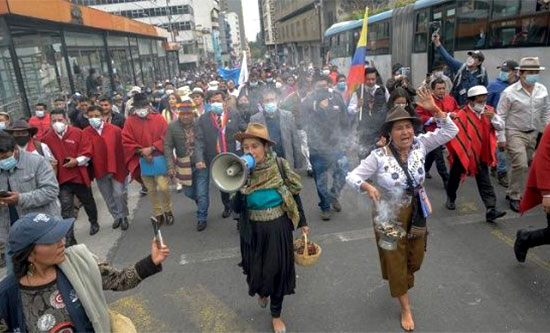
On 30 June the right-wing government of Guillermo Lasso was forced to the negotiating table after an 18-day national strike. Protesters, led by the Confederation of Indigenous Nationalities of Ecuador (CONAIE), demanded change after a year of destitution under the Lasso government. The mass movement fought back against the deepening cost of living crisis and worsening conditions, resulting in the government being pressured into a series of concessions.
Since Lasso’s election as president in 2021, public services have been neglected, inequality has deepened and he has prioritised safeguarding the interests of big business over the interests of the Ecuadorian people. Employment is just under 40% and one in three Ecuadorians live on less than $2.85 a day. Lasso’s neo-liberal policies have further destroyed public health provisions post-pandemic and have led to the breakdown of the education system.
After Lasso’s unexpected success in 2021, he developed a closer relationship with the IMF. In September 2021, Lasso’s government reached a deal with the IMF for a $1.5bn loan, plus $4.5bn from other multilateral organisations like the World Bank and the Inter-American Development Bank. In return, Lasso promised to cut state spending, cancel subsidises (such as for fuel) and raise taxes. These measures are affecting the most vulnerable sections of the working class. In response to these vicious attacks, on 20 May 2022 CONAIE and other organisations announced they were prepared to respond with mass protests.
On 13 June CONAIE, alongside student groups and labour unions, published a list of ten demands. These include freezing fuel prices, guaranteeing key sectors of the economy will not be privatised, halting the expansion of oil and mining industries and the cancellation of debts for small and medium-sized farmers. These demands directly challenge Lasso’s neo-liberal policies and the dictates of the IMF.
On the same day, strikes began in the capital city Quito and were hugely successful, sending shock waves around the country. Protesters blocked roads, including the major Pan American Highway that passes through 12 countries. They were joined by protesters outside Quito, who closed access to the city from their provinces.
After the first day of strike action Lasso called for dialogue amid the most serious challenge to his government, but it was clear that the popular movement had formed mass resistance – insisting on a change of policy rather than negotiations. From the start, the authorities responded with brutal use of force, including the indiscriminate use of tear gas, which has caused hundreds of injuries. Hundreds of people have been detained. The Alliance of Ecuadorian Human Rights Organisations recorded 39 types of human rights violations committed against protesters.
On 14 June Lasso escalated the situation by detaining two indigenous leaders, Leonardis Izas (the President of CONAIE) and Pepe Luis Acacho (a prominent indigenous leader), for blockading highways and other alleged violent acts under suspicious circumstances. They were both taken to three successive undisclosed locations, including military and air force bases.
By 17 June over 20 more indigenous activists had been detained. Lasso and the ruling elite have attempted to threaten the indigenous movement through state repression. The ruling elite’s attempt to demoralise the indigenous movement backfired and strengthened the resolve of protesters. Five days after the strike began, on 18 May, Lasso declared a state of emergency, an executive decree which allows the president to suspend the right to assembly and receive military support in times of disturbances or natural disasters.
On 21 June in Ambato youths led a huge crowed carrying homemade defence shields. The protesters marched towards a government building chanting ‘Who rules? The people? Or the government of the banker Lasso?’ The police offered no resistance, they were outnumbered. Protesters successfully took over the building, which they renamed Casa del Pueblo (House of the People), signalling the strength of the masses and exposing the waning power of the ruling elite.
The Ecuadorian media has spewed out racist narratives, labelling protesters ‘Indian vandals’ and ‘terrorists’. On 21 June, the 11th day of the strike, Lasso organised a ‘March for Peace’, which was characterised by racist speech against indigenous peoples participating in strike action. As well as being supported by the authorities, the pro-Lasso demonstration was widely reported in mainstream Ecuadorian media which intentionally avoided coverage of the violence by the ‘March for Peace’ participants against indigenous Ecuadorians.
Leonadis Iza, who has emerged as a figurehead of the national strike, responded to the racism deeply engrained within the ‘March for Peace’ and the supporters of Lasso, reminding the population that: ‘the fight has no colour because it belongs to … all of us who are totally screwed economically’. Despite the ruling class’ campaign of criminalisation of the mass movement and racism towards indigenous peoples, CONAIE and other organisations have remained determined to pursue the struggle.
After 18 days of police repression, murder and violence, in which six people were killed and thousands displaced, the government was forced to make concessions to get the masses off the streets. The government is clearly weak, with a recent poll recording Lasso’s popularity at just 16%. On 30 June Lasso was forced to the negotiating table with 90 days to deliver solutions to the demands of protesters. Some of the proposed deals includes a reduction in fuel prices (diesel from $1.90 to $1.75) and gas prices falling 15 cents. Lasso has also offered to scrap a proposed decree for oil projects and reform a similar one for mining projects, to allow the indigenous communities the right to be consulted on such developments.
The 2022 national strikes have adopted a similar character to the 2019 uprisings in Ecuador, with CONAIE acting as a leading force organising self-defence bodies and building on the lessons of 2019. Victory to the national strike! Down with the neo-liberal government of the banker Lasso!
Destinie Sanchez
FIGHT RACISM! FIGHT IMPERIALISM! 289 August/September 2022




